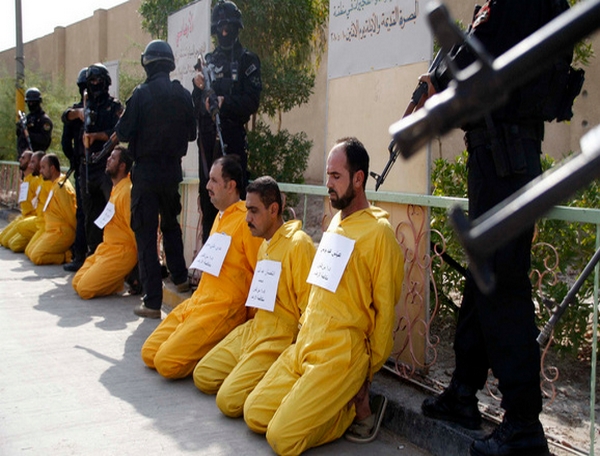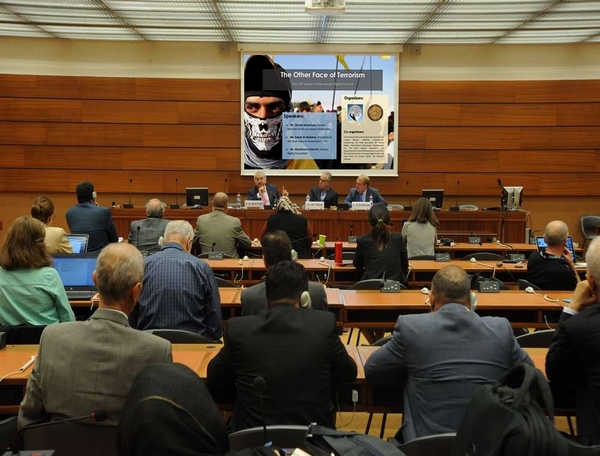Intimidations, threats and use of violence by the Iraqi authorities against peaceful demonstrators
Geneva International Centre for Justice sent a communication to the United Nations Special Rapporteur on Freedom of Peaceful Assembly and of Association, and to the United Nations Special Rapporteur on freedom of Opinion and Expression about the ongoing threats, intimidations and violence by the Iraqi authorities against peaceful demonstrators across Iraq.

Since 25 December 2012, hundreds of thousands Iraqi people are demonstrating across the country, and their number increases every day.
Why Iraqis are demonstrating?
The main demands of the demonstrators to the Iraqi authorities in the first two days were to set free women prisoners who are, according to the demonstrators and NGOs, subjected to systematic and ongoing rape, torture and other inhuman treatments inside Iraqi prisons and detention facilities.
Nevertheless, it is important to stress that the reasons behind these protests are wider than the issue of inhuman practices against women detainees. The demands of thousands of people, exercising their right to demonstrate peacefully, mainly concern two fundamental flaws characterizing the situation in Iraq since the US occupation of the country in 2003; the lack of respect for human rights and the absence of independence of the judiciary.
On 30 December 2012, tens of thousands of people demonstrated in the city of Fallujah after Friday prayers, holding signs declaring a “Friday of Honor”, while a mock funeral was held in Ramadi mourning what the demonstrators described as “the loss of independence of the Iraqi judiciary”.
In the following days, mass demonstrations took place in Mosul, in Ninewa province. There were also protests in the cities of Samarra and Tikrit in Salah al-Din province. These protests are taking place on a daily basis since then, and the number of people demonstrating increases every day.
The demands of the demonstrators
GICJ identified 10 demands made by the protesters to the authorities during these demonstrations; all of which directly concern the lack of respect for human rights by these authorities:
-To release all women prisoners detained under article 4 of the Anti-Terrorist law, to transfer those who are accused under criminal cases to their respective provinces, and for all individuals and officials who have been negligent and who participated in the rape of women prisoners to be held publicly accountable.
-To put an end to the application of the death penalty in the current context of lack of independence of the judiciary, as it has been requested by the United Nations High Commissioner for Human Rights and many Special procedures mandate-holders.
-To suspend the application of article 4 of the Anti-Terrorist law and to suspend judicial procedures based on this law until its abrogation by the parliament, as this law is being used systematically as a mean to eliminate political opposition and to discriminate against certain fractions of the Iraqi people. Moreover, this law was heavily used to provide the juridical basis of many death sentences issued by judges, which in the context of lack of independence of the judiciary, cannot be tolerated.
-The parliament must rapidly adopt the amnesty law, remove all the exceptions contained in it, and release all detainees.
-To stop applying the “Accountability and Justice” Law until its abolition by the parliament. This law, which is the extension of the “De-baathification” Law introduced in the Iraqi judicial system by the US occupying power in Iraq, has been used systematically as a tool to suppress political opposition and discriminate against large parts of the Iraqi society.
-To achieve balance in all state institutions and in particular in military and judiciary institutions, and to take the necessary actions to ensure a decent life for all Iraqis.
-To cancel the Military Operation Commands in all Iraqi provinces and suppress all non constitutional security apparatus, to withdraw the army from cities and residential areas in Iraq, to remove concrete barriers restricting the freedom of Iraqi people, to work to ensure the security of citizens in the new Iraq and to entrust the security of Iraqi citizens to police forces composed by people of the country.
-To ban the use of sectarian criteria as a basis for employment in State’s institutions, and to ban the use of sectarian slogans and phrases in all state institutions, especially security institutions, as well as in the media and schools.
-To stop conducting random night raids, the accused should be arrested at day time and with respect to all legal procedures, and to abolish the law allowing security forces to receive information from confidential sources, as this law is often used as a tool to harass and persecute people based on sectarian and religious differences.
-To speed up the formation of the Supreme Federal Court, to ensure that it is constituted of honest and professional judges who do not have any party or political affiliation with the political forces governing the country, in order to guarantee the independence of the judiciary.
The answer of the Iraqi authorities to the protests: Threats, intimidations and use of violence
The demands expressed by the Iraqi people were met by the Iraqi authorities with intimidation, threats and use of violence against demonstrators asking for the restoration of their human rights.
According to GICJ’s information, on 28 December 2012, army units prevented demonstrators from entering Al-Anbar province, while journalists attempting to travel to Ramadi and Fallujah to cover the protests there were stopped at an army checkpoint for up to six hours, preventing them from reaching the protests.
In the streets of Mossul, on Friday 4 January as well as on Monday 7 January 2012, the Iraqi army opened fire on the demonstrators, trying to disperse them. The governor of Nineveh province, Atheel Al-Nujaifi, stated that Security forces opened fire and used batons to disperse demonstrators.
On 9 January 2013, the Iraqi authorities commanded units of the Iraqi Army to close all border points with Jordan, Syria and Saudi Arabia. The highway which passes through the border point of Traibeel between Iraq and Jordan lies in a key trade route and is used by people of Al-Anbar and other Iraqi provinces to transport food and daily life items. According to a member of Al-Anbar’s Council, Hikmat Suleiman, in an interview with Al-Arabiya channel, the Iraqi authorities decided to close the borders between Jordan and Iraq in order to put pressure on the demonstrators. Confirming this statement, Imad Mishaal, mayor of the city of Rutbah, a town located close to the borders with Jordan, told Al-Arabiya that the Iraqi authorities were waging an economic war to pressure the protesters to stop demonstrating.
On 16 January 2012, several figures of political parties who are part of the current political process and part of the government of Iraq decided to put in place a joint committee to study the demands of the demonstrators. But the demonstrators perceive this step as a manoeuvre to mislead the public because most of these political figures have been involved in mass violations of human rights in Iraq since 2003.
GICJ requests to the United Nations Special Rapporteur on Freedom of Peaceful Assembly and of Association
GICJ considers the current situation as being of particularly serious concern for the Iraqi people and requests the urgent intervention of the Special Rapporteur on Freedom of Peaceful Assembly and of Association to remind the Iraqi authorities of their obligation to respect and fully protect the rights of Iraqi people to assemble peacefully and associate freely, as enshrined in article 19 of the Universal Declaration of Human Rights as well as in Human Rights Council Resolution 15/21 on the right to freedom of peaceful assembly and of association.
GICJ also asks the Special Rapporteur to take into account in his future reports presented to the Human Rights Council the violations of the rights to freedom of peaceful assembly and of association, as well as the threats and use of violence, harassment, persecution and intimidation by the Iraqi authorities directed at Iraqi people exercising these rights.
Finally, GICJ urges the Special Rapporteur to draw the attention of the Council and the High Commissioner to this deeply concerning situation, and to consider requesting a country visit to Iraq, as this has not been made yet by the Special Rapporteur’s office, in order to report on the full extent of the situation.
Documenting and reporting human rights violations in Iraq
| Executions | Human Rights Violations in the context of fight against terrorism | Peaceful protests | ||||
 |
 |
 |
||||
 |
 |
 |
||||







